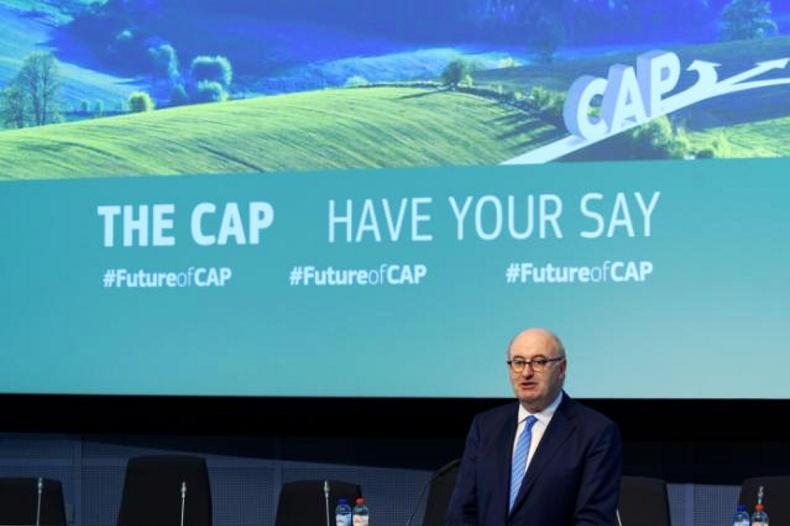The European Commission put its Common Agricultural Policy proposals post-2020 on the table on Friday 1 June. The Commission is one of three key institutions in Brussels that forms new legislation.
The two co-legislators, the European Parliament and the Council of the EU, adopt legislation jointly (in most policy areas including agriculture).
Neither of them can adopt legislation without the agreement of the other, and both co-legislators have to approve an identical text.
There can be up to three readings, and the council and parliament can agree a text at any of the readings. If in theory it went beyond that, then the Commission may have to go back to the drawing board and draft a new proposal.
The reality is that most files that go through co-decision are adopted at the first or second reading. Out of the 152 files that went through co-decision from 2014 to 2016, 75% were agreed at the first reading, 22% at the second reading and 3% at the third reading.
Parliament
The Commission’s proposal will be referred to the committee responsible for it in parliament on 20 June.
This group will appoint a rapporteur to draft the parliament’s report and act as spokesperson for it.
A rapporteur is appointed by the political group who leads the file through the various stages of the procedure. Shadow rapporteurs are appointed by the remaining political groups. They co-ordinate amendments during the negotiations.
Its negotiating team with the council is led by the rapporteur and presided over by the chair of the committee responsible (eg the Agriculture and Rural Development Committee). The shadow rapporteurs are also on the team.
MEP elections
A new European Parliament will be elected in May 2019. Sources within the Parliament say that the opinion around the timing of the Commission’s proposal is mixed among current Members of the European Parliament (MEPs).
Some hold the view that it was left too late and that it should have been earlier to allow the ordinary legislative procedure to have been concluded before the elections. Others believe that allowing a new parliament to pick up where negotiations were left off before elections, will mean that the new group of MEPs will be able to put their own stamp on it and not be saddled with an agreement made by the old parliament.
New Commission
The European Commission has one member for each of the member states. Its president is proposed by the European Council and formally elected by the European Parliament. That person then forms its College of Commissioners, similar to how a Government cabinet is formed, and that selection is ratified by Parliament. A new Commission will be formed in November 2019.
2018-19: Debate in the European Council and Parliament on the CAP proposals
Spring 2019: Potential agreement of the next MFF 2021-2027 by the heads of states and governments
Spring 2019: Potential adoption of the CAP 2021-2027 by the co-legislators
May 2019: elections of the European Parliament
2021:
Potential entry into force of the next CAP
Last time
For the 2013 reform, the proposals were presented to the Agricultural Council of Ministers in October 2011. A partial general approach was reached in March 2013. The plenary vote in the Parliament took place in November 2013 and the adoption of the legislation in the first reading was on 13 December 2013 after many trilogues.
Read more
Payment boost for small and young farmers
The European Commission put its Common Agricultural Policy proposals post-2020 on the table on Friday 1 June. The Commission is one of three key institutions in Brussels that forms new legislation.
The two co-legislators, the European Parliament and the Council of the EU, adopt legislation jointly (in most policy areas including agriculture).
Neither of them can adopt legislation without the agreement of the other, and both co-legislators have to approve an identical text.
There can be up to three readings, and the council and parliament can agree a text at any of the readings. If in theory it went beyond that, then the Commission may have to go back to the drawing board and draft a new proposal.
The reality is that most files that go through co-decision are adopted at the first or second reading. Out of the 152 files that went through co-decision from 2014 to 2016, 75% were agreed at the first reading, 22% at the second reading and 3% at the third reading.
Parliament
The Commission’s proposal will be referred to the committee responsible for it in parliament on 20 June.
This group will appoint a rapporteur to draft the parliament’s report and act as spokesperson for it.
A rapporteur is appointed by the political group who leads the file through the various stages of the procedure. Shadow rapporteurs are appointed by the remaining political groups. They co-ordinate amendments during the negotiations.
Its negotiating team with the council is led by the rapporteur and presided over by the chair of the committee responsible (eg the Agriculture and Rural Development Committee). The shadow rapporteurs are also on the team.
MEP elections
A new European Parliament will be elected in May 2019. Sources within the Parliament say that the opinion around the timing of the Commission’s proposal is mixed among current Members of the European Parliament (MEPs).
Some hold the view that it was left too late and that it should have been earlier to allow the ordinary legislative procedure to have been concluded before the elections. Others believe that allowing a new parliament to pick up where negotiations were left off before elections, will mean that the new group of MEPs will be able to put their own stamp on it and not be saddled with an agreement made by the old parliament.
New Commission
The European Commission has one member for each of the member states. Its president is proposed by the European Council and formally elected by the European Parliament. That person then forms its College of Commissioners, similar to how a Government cabinet is formed, and that selection is ratified by Parliament. A new Commission will be formed in November 2019.
2018-19: Debate in the European Council and Parliament on the CAP proposals
Spring 2019: Potential agreement of the next MFF 2021-2027 by the heads of states and governments
Spring 2019: Potential adoption of the CAP 2021-2027 by the co-legislators
May 2019: elections of the European Parliament
2021:
Potential entry into force of the next CAP
Last time
For the 2013 reform, the proposals were presented to the Agricultural Council of Ministers in October 2011. A partial general approach was reached in March 2013. The plenary vote in the Parliament took place in November 2013 and the adoption of the legislation in the first reading was on 13 December 2013 after many trilogues.
Read more
Payment boost for small and young farmers






 This is a subscriber-only article
This is a subscriber-only article










SHARING OPTIONS: